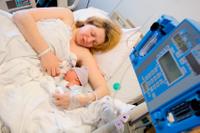- If you are constipated or bowel movements are painful, try over-the-counter stool softeners or a milk laxative such as milk of magnesia. Drink lots of water and eat plenty of fruits and vegetables.
- Severe pain in your abdomen or redness, swelling and oozing pus at your incision site may mean you have an infection. Contact your healthcare provider immediately.
- Call your healthcare provider if: You have increased oozing or blood coming from your incision, there is yellow or green discharge coming from your incision, your pain is getting worse or isn’t helped by pain medicine, your incision is opening up, you have hot tender areas around your incision, or you have a fever of more than 38°C.
- Sometimes mothers and babies need specialized health care. A baby may need to be admitted to the Special Care Nursery (SCN) for closer observation. If your baby needs further medical treatments, he or she may be moved to a Neonatal Intensive Care Unit (NICU), perhaps to another hospital.
- Every hospital provides specific services. Sometimes this means that a baby’s birth may be at a different hospital from what was planned. It may also mean moving the mother or the baby to another hospital. If this is necessary, the doctors – together with the parents – will make the decision.
- A mother’s or baby’s hospital stay may be stressful for the whole family. The health care team will provide as much information and support as possible to help your family cope. If you have concerns, talk to your health care team. After your baby leaves the hospital your family’s doctor(s), public health nurses and other agencies will continue to provide support.
Decreasing your chances of a cesarean
Cesarean birth may be necessary for some women, but there are a number of things that you can do to decrease your risk of needing a cesarean delivery.
- Educate yourself on maintaining your health during pregnancy and about normal labour and birth
- Hire a Doula. Research has shown that women who have a trained doula supporting them in childbirth use less medication, have fewer interventions and have a lower cesarean rate
- Communicate with your caregivers
- Stay home in early labour

- Avoid unnecessary interventions. For instance, scheduling an induction because you are tired of being pregnant will increase the likelihood of needing a cesarean section
- Avoid using pain medication especially in early labour, instead try using coping techniques that do not require medication for as long as possible
- Stay upright and moving during labour